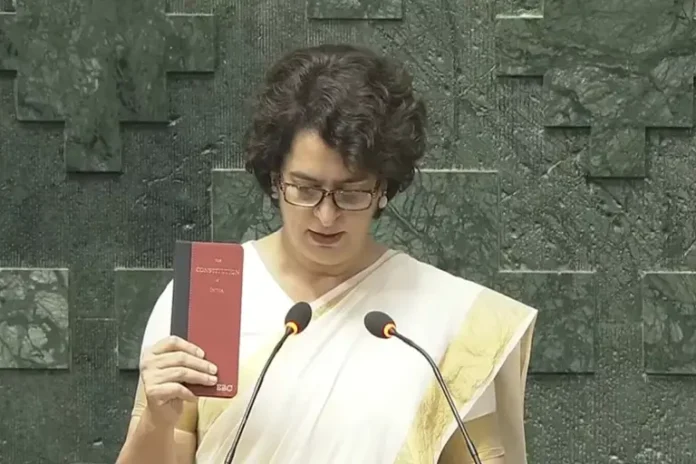Priyanka Gandhi Vadra’s historic entry into Parliament marks a pivotal moment for the Indian National Congress (INC) and the broader political landscape of India. Her decisive victory in the Wayanad by-election not only secures her place in the Lok Sabha but also symbolizes the consolidation of the Nehru-Gandhi family’s influence, with all three prominent family members—Sonia Gandhi, Rahul Gandhi, and Priyanka Gandhi Vadra—now serving as Members of Parliament. This development comes at a time when the Congress party is seeking to redefine its strategy and reinvigorate its presence in national politics.
A Symbolic and Strategic Victory
Priyanka’s triumph in Wayanad has both symbolic and strategic implications. The seat, previously held by her brother Rahul Gandhi, was vacated following his disqualification, making her victory a crucial step in maintaining the party’s foothold in Kerala. The substantial margin of her win underscores her ability to connect with voters and demonstrates the party’s continuing relevance in the state.
Her entry into Parliament comes at a time when the Congress is striving to counter the Bharatiya Janata Party’s (BJP) dominance and regain its position as a formidable political force. As an MP, Priyanka is expected to play a vital role in reshaping the Congress’s policy focus, strengthening its grassroots efforts, and presenting a united opposition.
Strengthening Congress’s Political Clout
The presence of all three Gandhis in Parliament could significantly enhance the Congress’s political clout, providing a more coordinated leadership to address critical national issues. Priyanka’s ability to connect with the masses, combined with Rahul’s focus on economic equality and Sonia’s political experience, creates a dynamic leadership team capable of steering the party through challenging times.
Together, the siblings can drive discussions on key issues such as women’s empowerment, education, and economic justice. Priyanka’s entry adds a fresh dimension to these debates, particularly as a prominent female leader in Indian politics. Her charisma and empathetic approach to campaigning have the potential to attract younger voters and re-energize the party’s support base, especially in regions where it has struggled electorally.
Revitalizing the Party Image
Priyanka Gandhi Vadra’s political persona—rooted in her ability to connect with grassroots movements and address pressing local concerns—represents a significant opportunity for Congress to revitalize its image. Her campaign in Wayanad highlighted her focus on regional issues, such as disaster relief for landslide victims, which resonated with voters.
This grassroots approach is expected to be a cornerstone of her strategy as she works to rebuild the party’s support base. Priyanka’s efforts to engage with young voters and address their aspirations could help Congress position itself as a modern, inclusive alternative to the BJP, which has dominated the political narrative in recent years.
Challenges and Criticism
Despite the optimism surrounding Priyanka’s entry, it is not without challenges. Critics argue that the Congress’s continued reliance on the Gandhi family perpetuates dynastic politics, potentially stifling the emergence of new leadership within the party. This perception could alienate sections of the electorate, particularly those seeking a break from traditional political structures.
Internally, Priyanka will need to navigate complex party dynamics, balancing her responsibilities as an MP with broader leadership expectations. Her ability to manage these demands while addressing criticisms of dynastic politics will be critical to her success.
Externally, the Congress faces the daunting task of countering the BJP’s dominance, which extends across most of India’s key states. Priyanka’s ability to translate symbolic victories into substantive political gains will be closely scrutinized, as will her effectiveness in presenting a compelling alternative to the BJP’s majoritarian narrative.
Impact on Policy and Strategy
Priyanka’s presence in Parliament is expected to influence Congress’s stance on key policy issues, particularly those related to women’s empowerment and education. As a vocal advocate for gender equality, her leadership could invigorate discussions on increasing women’s representation in politics and addressing systemic barriers to their participation.
Regionally, her win in Wayanad highlights the importance of Congress’s strategy in Kerala and the South. Her focus on local issues may shape the party’s broader policy agenda, emphasizing the need for targeted solutions to regional challenges.
Within the framework of the INDIA bloc—a coalition of opposition parties—Priyanka’s role could be pivotal in fostering unity and shaping the coalition’s strategy against the BJP. However, this role will require careful navigation of inter-party dynamics and power-sharing arrangements.
Future Implications
Priyanka Gandhi Vadra’s successful entry into Parliament marks the beginning of a new chapter for the Congress party. Her role has the potential to redefine opposition politics, enhance Congress’s visibility on national issues, and reinvigorate its organizational structure.
Her transition from a campaign strategist to a frontline leader will be closely watched, as will her ability to deliver tangible results in Parliament. If she can effectively articulate a clear vision for the Congress and address the concerns of diverse voter groups, she could emerge as a key player in shaping the party’s future trajectory.
Priyanka Gandhi Vadra’s presence in Parliament represents a significant opportunity for the Indian National Congress to reassert itself in national politics. Her ability to navigate internal challenges, counter BJP dominance, and connect with a diverse electorate will determine her impact on the party’s fortunes. As the Congress seeks to position itself as a credible alternative to the BJP, Priyanka’s leadership could be crucial in shaping its path forward. The coming months will be critical as she establishes her presence in Parliament and works to redefine the Congress’s role in Indian politics. Her journey has the potential to be transformative, not just for her party but for the broader political landscape of the country.



